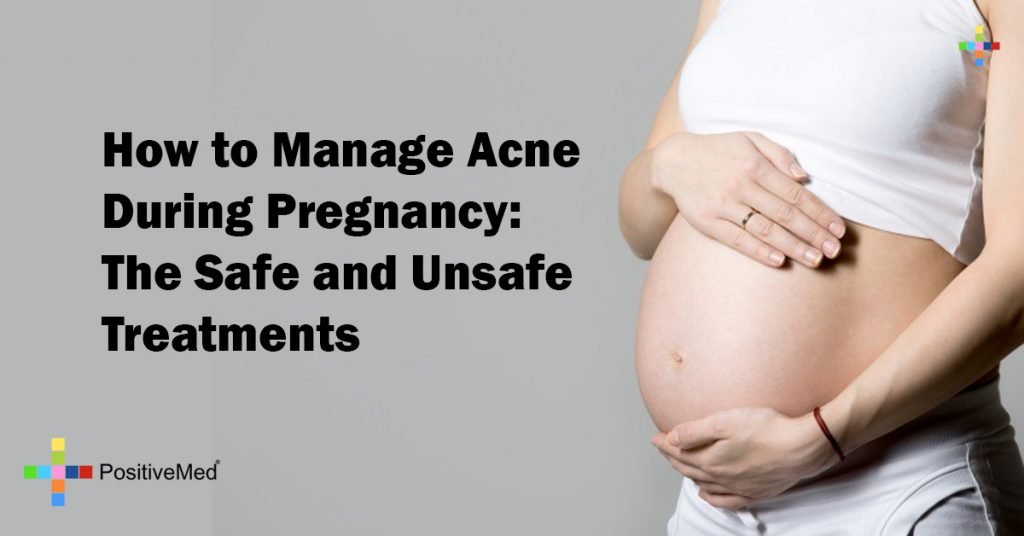
How to Manage Acne During Pregnancy:
The Safe and Unsafe Treatments
Dr. Agnes P. Olszewski
The fact is that more than 1 out of every 2 pregnant women can expect to develop acne. And for some, acne may be severe. Using any type of medications, including acne treatments, during pregnancy presents a dilemma: the expectant mother needs to make certain the safety of the baby as well as the mother is preserved. So how do we know what’s safe and what’s not?
Why Acne Develops During Pregnancy
Acne is an external manifestation of an internal imbalance that leads to overproduction of sebum (skin oil) by sebaceous glands. This extra sebum together with dead skin cells creates an ideal condition for bacterial growth, which can promote inflammation. The first stage of acne usually starts as oily skin; the next stage is the appearance of comedones (whiteheads and blackheads). If the pore becomes inflamed due to the influx of white blood cells, pustules and papules appear. If the inflammatory response spreads to adjacent tissue, this represents cystic acne.
The primary cause of the over-secretion of sebaceous glands is actually an imbalance in circulating levels of $e* hormones (androgens, otherwise known as testosterone, estrogen and progesterone). Both women and men produce all three hormones but, of course, in different amounts.
During pregnancy, especially during the first trimester, estrogen and progesterone levels increase therefore increasing the skin’s production of sebum. The risk of getting acne during pregnancy is higher; however, it is rather difficult to predict who will suffer from more severe acne flare-ups, and which women will “glide” through this period without acne problems. One risk factor is whether you have a history of acne or experienced acne flares at the start of your menstrual cycle. If so, you may have a higher risk of experiencing acne during your pregnancy. If you do not develop acne during the first trimester, it’s unlikely you’ll have this problem at all since it is rare to get acne in the second or third trimesters.
How to Treat Acne When You’re Pregnant
Unfortunately, many prescription and over-the-counter acne treatments come with a high risk of birth defects so avoiding them is both a necessity and responsibility we have to take very seriously. Below is information that can help keep you and your unborn baby safe.

What to Avoid: Unsafe Acne Treatments During Pregnancy
- Isotretinoin. Isotretinoin is known under the brand name Accutane and a number of generic names. It is an oral product used mostly for treating severe acne. However, it’s especially dangerous before and during pregnancy as the drug is known to affect a fetus and cause serious birth defects.
- Hormone therapy. This includes the “female” hormone estrogen and the anti-androgens flutamide and the potassium sparing diuretic spironolactone.
- Oral tetracyclines. These include antibiotics such as tetracycline, doxycycline and minocycline, which can inhibit bone growth and discolor new forming permanent teeth.
- Topical retinoids such as adapalene (Differin), tazarotene (Tazorac) and tretinoin (Retin-A). Topical retinoids are actually similar to isotretinoin since they may reach the blood stream. Although studies show that the amount of these medications absorbed through the skin is low (about 5%), they still may increase the risk of birth defects. Please note that all retinoids or cosmetic products that contain them are required to carry a warning that states it is unknown whether they can harm a developing baby or a child that is being breastfed.
- Salicylic acid. For the same reasons, many experts also recommend against using topical treatments containing salicylic acid while pregnant. This is an ingredient found in almost all over-the-counter acne products with Proactiv®, NatureCure®, Clearsil® and other known brands. As for those who are not pregnant and/or do not plan on having a baby within the immediate future (up to 6 months), use of these products may have limited efficacy in treating acne but is not harmful (with the exception of possibly drying, irritating or prematurely aging your skin). Sun restrictions may also be necessary.
What to Use: Safe Acne Skincare for Mommy-to-Be
If your acne is mild and you did not suffer from acne before becoming pregnant, you may actually try to deal with your pregnancy breakouts without any specific acne products. This route is by far the safest. Here are some helpful tips:
- Avoid squeezing or popping pimples, cysts, blackhead or whiteheads. This may result in additional inflammation leading to skin damage and possibly permanent acne scars.
- Limit washing your face (and body if you have body acne) to two times per day or after heavy sweating. Over-washing and over-drying your skin will actually stimulate sebaceous glands (it is a skin self-protection mechanism) to produce more oil.
- When you clean your face or body, use a gentle, oil-free, alcohol-free, and non-abrasive cleanser. Try DIY chamomile astringent twice a day to keep your skin moist and bacteria free.
- Use a soft washcloth (change it every time you wash) or cotton pads, but be gentle, and do not rub or injure your skin in any way. Micro-abrasions open the door, so to speak, for bacteria and may cause more breakouts.
- Using lukewarm rather than hot water. Hot water will over-dry the skin and therefore stimulate the glands.
- Avoid over-cleansing and over-drying; to dry your skin after washing, pat gently.
- Use noncomedogenic moisturizer regularly twice a day.
- Use natural DIY acne-prone skin masks.
- Shampoo regularly. If you have oily skin, it’s best to shampoo daily. Avoid oily hair conditioners and heavy hair mousses.

Why Take a Risk? An Alternative Option for Acne Treatment
If your acne is moderate or severe during your first trimester, you may opt for modest use of over-the-counter topical products that contain either benzoyl peroxide or glycolic acid. Topical agents’ impact on acne blemishes may be only temporary and not necessarily very effective for moderate to severe acne, and they are not believed to pose an increased risk of birth defects.
Many soon-to-be pregnant or pregnant moms come to us because they simply don’t want to take any risks. Also, look into scientifically backed natural acne treatments that focus on rebalancing the body without directly impacting hormone levels. You and your obstetrician should review the entire list of ingredients before you take anything so you can make sure that nothing will adversely affect you and your baby.
So now that you are an educated mommy-to-be on acne skincare, that will free up your time to read more of the what to expect when expecting books. Enjoy this treasured time, and best of luck to you!
 Dr. Agnes Olszewski, CEO of Herborium, natural medicine expert
Dr. Agnes Olszewski, CEO of Herborium, natural medicine expert
“My work in China in the pharmaceutical and healthcare sector, and my personal experience while growing up in Europe, inspired me to develop Herborium®, a novel Botanical Therapeutics® company, based on a new, innovative healthcare concept that combines science and nature. Our approach has already been proven up to 98% effective in our acne treatment, AcnEase®
.”







